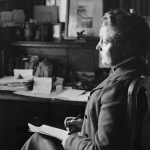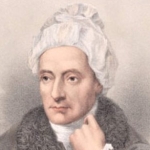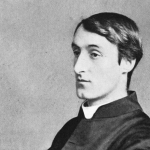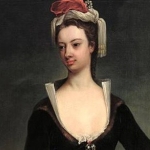1
ONE Day the Amarous Lisander,
By an impatient passion sway'd,
Surpris'd fair Cloris, that lov'd Maid,
Who cou'd defend her self no longer ;
All things did with his love conspire,
The gilded Planet of the Day,
In his gay Chariot, drawn by fire,
Was now descending to the sea,
And left no Light to guide the world,
But what from Cloris brighter Eyes was hurl'd.
2
In alone Thicket, made for Love,
Silent as yielding Maids Consent,
She with a charming Languishment
Permits his force, yet gently strove ?
Her Hands his Bosom softly meet,
But not to put him back design'd,
Rather to draw him on inclin'd,
Whilst he lay trembling at her feet;
Resistance 'tis to late to shew,
She wants the pow'r to say — Ah!what do you do?
3
Her bright Eyes sweat, and yet Severe,
Where Love and Shame confus'dly strive,
Fresh Vigor to Lisander give :
And whispring softly in his Ear,
She Cry'd — Cease — cease — your vain desire,
Or I'll call out — What wou'd you do ?
My dearer Honour, ev'n to you,
I cannot — must not give — retire,
Or take that life whose chiefest part
I gave you with the Conquest of my Heart.
4
But he as much unus'd to fear,
As he was capable of Love,
The blessed Minutes to improve,
Kisses her Lips, her Neck, her hair !
Each touch her new Desires alarms !
His burning trembling Hand he prest
Upon her melting Snowy Breast,
While she lay panting in his Arms !
All her unguarded Beauties lie
The Spoils and Trophies of the Enemy.
5
And now, without respect or Fear,
He seeks the Objects of his Vows ;
His Love no Modesty allows :
By swift degrees advancing where
His daring Hand that Alter seiz'd,
Where Gods of Love do Sacrifice ;
That awful Throne, that Paradise,
Where Rage is tam'd, and anger pleas'd ;
That Living Fountain, from whose Trills
The melted Soul in liquid Drops distils.
6
Her balmy Lips encountring his,
Their Bodies as their Souls are joyn'd,
Where both in Transports were confin'd,
Extend themselves upon the Moss.
Cloris half dead and breathless lay,
Her Eyes appear'd like humid Light,
Such as divides the Day and night;
Or falling Stars, whose Fires decay ;
And now no signs of Life she shows,
But what in short-breath-sighs returns and goes.
7
He saw how at her length she lay,
He saw her rising Bosom bare,
Her loose thin Robes, through which appear
A Shape design'd for Love and Play;
Abandon'd by her Pride and Shame,
She do's her softest Sweets dispence,
Offring her Virgin-Innocence
A Victim to Loves Sacred Flame ;
Whilst th' or'e ravish'd Shepherd lies,
Unable to perform the Sacrifice.
8
Ready to taste a Thousand Joys,
Thee too transported hapless Swain,
Found the vast Pleasure turn'd to Pain :
Pleasure, which too much Love destroys !
The willing Garments by he laid,
And Heav'n all open to his view ;
Mad to possess, himself he threw
On the defenceless lovely Maid.
But oh ! what envious Gods conspire
To snatch his Pow'r, yet leave him the Desire !
9
Natures support, without whose Aid
She can no humane Being give,
It self now wants the Art to live,
Faintness it slacken'd Nerves invade :
In vain th' enraged Youth assaid
To call his fleeting Vigour back,
No Motion 'twill from Motion take,
Excess of Love his Love betray'd ;
In vain he Toils, in vain Commands,
Th' Insensible fell weeping in his Hands.
10
In this so Am'rous cruel strife,
Where Love and fate were too severe,
The poor Lisander in despair,
Renounc'd his Reason with his Life.
Now all the Brisk and Active Fire
That should the Nobler Part inflame,
Unactive Frigid, Dull became,
And left no Spark for new Desire ;
Not all her Naked Charms cou'd move,
Or calm that Rage that had debauch'd his Love.
11
Cloris returning from the Trance
Which Love and soft Desire had bred,
Her tim'rous Hand she gently laid,
Or guided by Design or Chance,
Upon that Fabulous Priapus,
That Potent god (as Poets feign.)
But never did young Shepherdess
(Gath'ring of Fern upon the Plain)
More nimbly draw her Fingers back,
Finding beneath the Verdant Leaves a snake.
12
Then Cloris her fair Hand withdrew,
Finding that God of her Desires
Disarm'd of all his pow'rful Fires,
And cold as Flow'rs bath'd in the Morning-dew.
Who can the Nymphs Confusion guess ?
The blood forsook the kinder place,
And strew'd with Blushes all her Face,
Which both Disdain and Shame express ;
And from Lisanders Arms she fled,
Leaving him fainting on the gloomy Bed.
13
Like Lightning through the Grove she hies,
Or Daphne from the Delphick God ;
No Print upon the Grassie Road
She leaves, t' instruct pursuing Eyes.
The wind that wanton'd in her Hair,
And with her ruffled Garments plaid,
Discover'd in the flying Maid
All that the Gods e're made of Fair.
So Venus, when her Love was Slain,
With fear and haste flew o're the fatal Plain.
14
The Nymphs resentments, none but I
Can well imagin, and Condole ;
But none can guess Lisander's Soul,
But those who sway'd his Destiny :
His silent Griefs, swell up to Storms,
And not one God, his Fury spares,
He Curst his birth, his Fate, his Stars,
But more the Shepherdesses Charms ;
Whose soft bewitching influence,
Had Damn'd him to the Hell of Impotence.















Comment form: